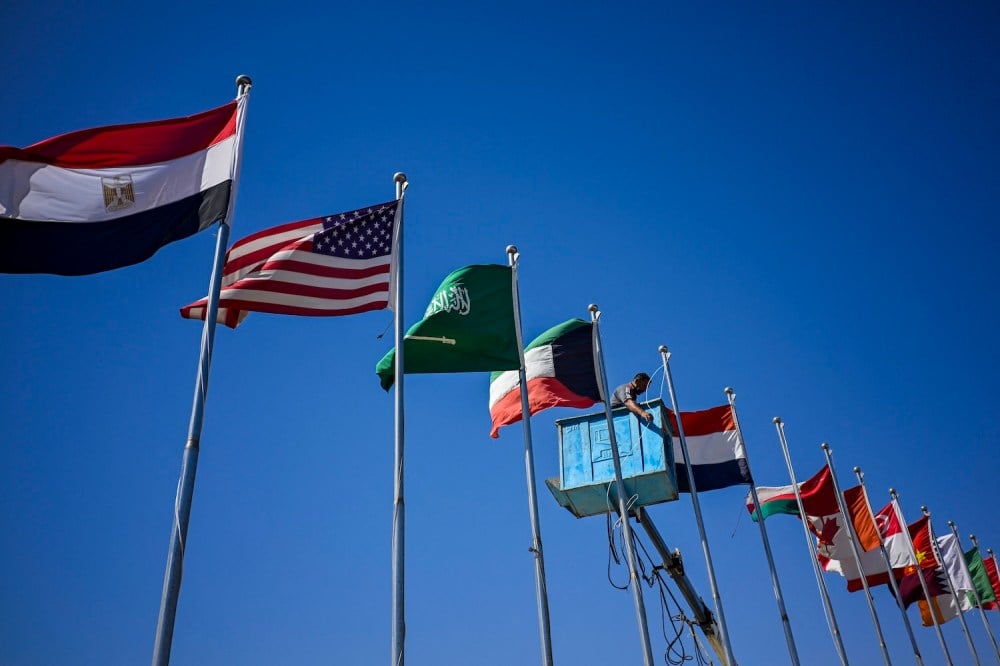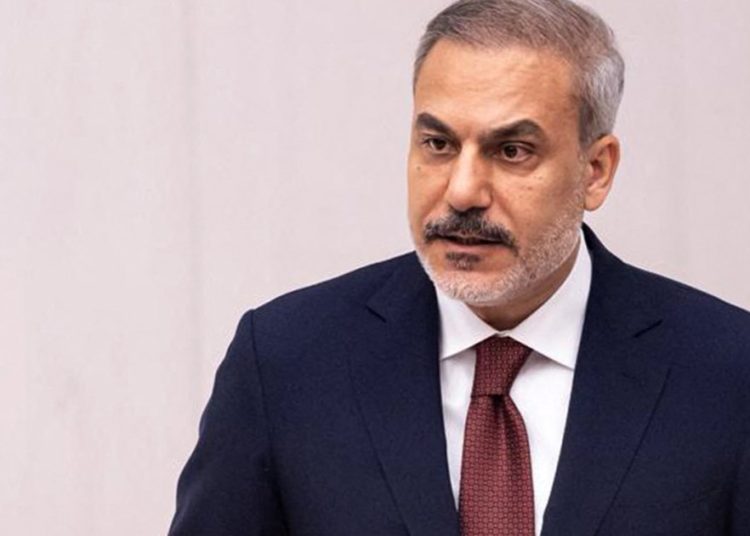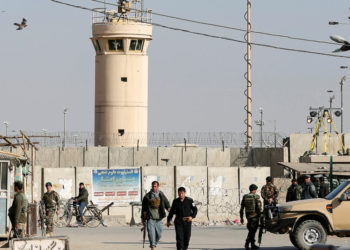When the latest Israel-Hamas cease-fire deal was announced on Oct. 9, Israeli negotiator Alon Nitzan celebrated by hugging his interlocutor, Qatari Prime Minister Mohammed bin Abdulrahman Al Thani. That image stood in sharp contrast to the events of one month prior, when Israel bombed a central Doha neighborhood and Al Thani subsequently denounced Tel Aviv’s “state terrorism.” Some observers then questioned whether the Trump administration’s equivocal response to Israel’s strike and the crisis of confidence it precipitated meant that the Gulf states would now pivot away from the United States.
Cool heads, however, prevailed. The Gulf Cooperation Council (GCC) states did not replace the U.S. security umbrella. Instead, the GCC states and the United States collaborated closely on the latest Gaza cease-fire. While, in a clear break from previous policy, the Trump administration proclaimed that it would consider any future attack on Qatar to constitute a direct threat to the United States. It may now be about to offer Saudi Arabia the same guarantee.
There is broader inference here. Despite the GCC’s recent anxiety, it will not change its geopolitical orientation. In the last two years, Israel has hobbled Iran and its allies, opening the space to reshape the region’s political landscape. But by leaning too heavily on military force at the expense of a “day after,” Israel has left a vacuum that the Gulf states have been quick to fill.
Regardless of whether the Israel-Hamas war is over or not, this is why the GCC states, not Israel, are best poised to reshape the region. But whether they, or the region, can ultimately reap the benefits remains to be seen.
Throughout the war, the Gulf states—particularly the United Arab Emirates and Saudi Arabia—remained dogged by claims that they were happy to see Iran’s wings clipped and even secretly backed Israel’s expanded campaign, regardless of their public proclamations.
This is an oversimplification. The GCC has long seen Iran as a rival. But Saudi Arabia and Iran agreed to a Chinese-mediated normalization deal in 2023. After getting bogged down fighting the Houthis in Yemen, Saudi Crown Prince Mohammed bin Salman pivoted away from military adventurism and focused on internal state-building. Other Gulf states followed; most have their own version of Saudi’s Vision 2030, a long-term plan to end the country’s overreliance on oil. This vision is predicated on quiet, which is why Saudi Arabia stopped aggressively confronting Iran and its allies and opted for detente instead.
Yet while removing themselves from Iran’s crosshairs, Gulf leaders still watched Iran’s increasing regional clout with unease. Israeli Prime Minister Benjamin Netanyahu, in turn, positioned his country as a regional enforcer that could contain the so-called Axis of Resistance and uphold the regional status quo. While Israel normalized relations with the UAE and was apparently poised to the same with Saudi Arabia, Israel worked with Qatar to fund a cash-strapped Hamas and keep the regime in Gaza afloat.
Hamas’s Oct. 7, 2023, attack on Israel ended this dynamic. It caused many Israelis to see their grand strategic preference for calm as naive and dangerous. Israel then practiced aggressive regional revisionism, which is exactly what it had long condemned Iran for. The Gulf states, however, sought the exact opposite: ending the war as quickly as possible. For some time, they minimized the conflict’s impact on their development agendas; while the Houthis escalated their campaign against Israel, they refrained from targeting the UAE or Saudi Arabia.
That lasted until this year, which has been tumultuous for the GCC states. They saw their influence reach unprecedented heights in May, when they showered a visiting U.S. President Donald Trump with gifts. In June and September, though, the Gulf’s worst nightmare came true when Qatar acquired the unwelcome distinction of being bombed by both Iran and Israel.
Belatedly, the Trump administration realized that enabling or downplaying an Israeli attack on a country that former U.S. President Joe Biden deemed a major non-NATO ally undermined the United States’ reputation and value as a great-power security guarantor. In response, Trump forced Netanyahu to make a groveling apology to the Qatari emir. He also exerted what a White House insider described as “maximum pressure,” which forced Israel to “submit to peace.”
But the Israeli strike on Doha had another unintended consequence. It fed an increasing sense of regional insecurity and a feeling that the United States was a paper tiger or would readily throw the Gulf states under the bus to advance Israel’s interests.
To mitigate this perception, Washington gave Doha a written and public guarantee that it would see any future attack on Qatar as “a threat” to the United States’ “peace and security.” That was what every Gulf leader wanted—it was the closest that any GCC state had ever gotten to emulating NATO’s Article 5 and being unambiguously covered by the United States’ security umbrella. The United States had previously held back and dangled a formal security guarantee as a reward that would incentivize and follow further regional normalization with Israel.
In short, Israel’s strike on Doha was a disastrous own goal. It not only failed to kill its targets, but it also empowered Qatar to ask for and get an unprecedented U.S. concession.
This is why, despite Trump’s determination to expand the Abraham Accords, the United States’ response to the Doha strike makes this outcome less likely. Washington previously rewarded the UAE and Bahrain for joining the Abraham Accords but stopped short of offering them the concessions that Qatar received. It’s little wonder, then, that Saudi Arabia is now reportedly pushing to get the same deal.
The Doha strike and its political blowback also illustrate why Israel is poorly positioned to create what Netanyahu has repeatedly called a “new Middle East” from the ashes of the old regional order.
Over the last two years, Netanyahu’s policies have proved more effective at destroying than creating. Israel hobbled Iran, Hezbollah, and Hamas, and it contributed to the Assad regime’s collapse in Syria. But it did not convert military successes into political gains in any of those cases. Instead, it seems determined to live by the sword indefinitely; Israel still occupies parts of Lebanon and is extending its reach into Syria, while rebuffing diplomatic overtures from the new regime. Netanyahu steadfastly refused to pause the war in Gaza, until Trump forced his hand. Netanyahu’s “new Middle East,” then, looks a lot like the present. Former Israeli Foreign Minister Abba Eban once claimed that the Palestinians “never miss an opportunity to miss an opportunity.” For the past two years, though, this rings truer for Israel.
By contrast, the Gulf states aptly exploited the power vacuums that Israel has created. They invested $14 billion to rebuild Syria in 2025 and pledged more than $150 million for Lebanon in 2024. This is not just about investment: The GCC states are using their financial clout to pry both countries away from Iran’s geopolitical orbit. This is why Gulf lobbying convinced Trump to drop the crippling U.S. sanctions against Syria. Similarly, they have conditioned aid for Lebanon on Hezbollah disarming. In both Syria and Lebanon, their overlapping interests have meant that the GCC states have displayed a rare show of unity so far.
If the recent Israel-Hamas cease-fire holds, the Gulf states are poised to pick up the pieces in Gaza. The peace plan has Gulf fingerprints all over it and was publicly backed by Qatar, Saudi Arabia, and the UAE, illustrating that they retain their ability to shape Trump’s views and U.S. policy.
Indubitably, creating a new “day after” in Gaza, Lebanon, and Syria is a tall order. Saudi Arabia’s botched intervention in Yemen exemplifies the GCC states’ poor record in rolling back Iran. They may be good at buying influence but have almost no experience in foreign nation-building and post-conflict reconstruction. It is also a high-risk strategy that will require the Gulf states to expose themselves more than ever before.
But the biggest hurdle is Israel’s continued regional revisionism. The Gulf states’ internal state-building programs, such as Vision 2030, are predicated on zero problems with their neighbors. Similarly, the GCC states’ use of political and economic leverage to create a “day after” in Gaza, Lebanon, and Syria requires relative regional quiet. No amount of reconstruction or political rehabilitation can insulate from an Israeli decision to escalate, which can undo everything with the literal touch of a button. Alongside the Doha strike, this is why the GCC states increasingly see Israel—with its qualitative military edge and great-power backing—as more of a serious threat to regional stability than Iran ever was.
The Gulf states must employ their recent advantage as Trump whisperers to convince the United States to rein in Israel. The increasing U.S. pressure on Israel to not violate the latest Gaza cease-fire or annex the West Bank are tentative but encouraging signs that Washington is coming around to the Gulf’s way of thinking. Indeed, given Trump’s oft-stated desire to disengage from the Middle East and eschew nation-building, it is in the United States’ interests to encourage the Gulf states’ emerging grand strategy. Equally, the Trump administration’s recent concessions to Qatar have rendered further Gulf-Israel normalization less likely.
All this means that the United States should focus less on expanding the Abraham Accords and more on supporting tacit cooperation and deconfliction between the Gulf states and Israel. This would serve to prevent an Iranian resurgence and discourage Israel from destroying what the GCC states are trying to create.
The fact that Israel’s cabinet recently voted to rename the recent two-year conflict to the “war of revival” only reinforces the region-remaking undertones to Israel’s new grand strategy. But it is the Gulf states that are in the driver’s seat to create a “new Middle East.” Whether that influence endures depends on whether the Gulf states can rise to challenge of regional rebuilding and if they can use their ties to a particularly supportive U.S. administration to insulate any “day after” from Israel’s destructive tendencies.
The post Can the Gulf Rebuild the Middle East? appeared first on Foreign Policy.




